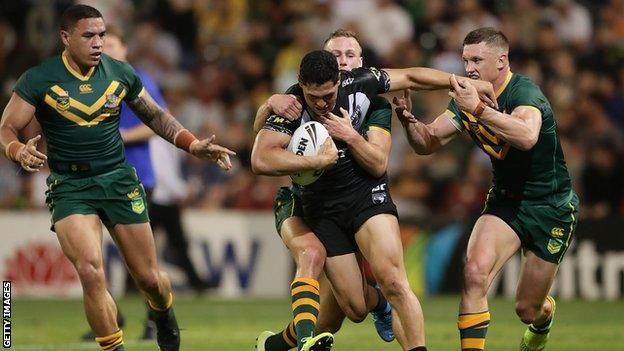Rugby League World Cup: Australia and New Zealand decision to pull out 'premature'
- Published

Australia are 11-times winners of the Rugby League World Cup, with New Zealand winning in 2008
Australia and New Zealand's decision to pull out of the Rugby League World Cup was "premature", according to Australia's players' union.
The Rugby League Players' Association (RLPA) says a number of its members wanted to travel to England for the tournament this autumn.
Australia and New Zealand withdrew on Thursday because of "player welfare and safety concerns" related to Covid-19.
RLPA chief executive Clint Newton said their decision was "disappointing".
"We have had feedback from a number of players eligible for these nations stating their intentions to compete in the tournament, pending more information becoming available in the coming weeks," he said in a statement.
"Clearly, the views of those players have not been enough to prevent this decision and we believe it has been made prematurely."
The RLPA represents players in Australia's National Rugby League (NRL), which also contains players from Tonga, Fiji and Samoa, who are still set to compete in the World Cup.
Newton says he will continue to work with tournament organisers to ensure the health and safety of players whose countries remain committed to the tournament.
"For players representing remaining participating nations, our priority will be to help ensure appropriate health and safety measures are in place, and also provide them with the relevant information to make an informed decision about participation," he added.
"We had anticipated that players from Australia and New Zealand would have that same opportunity, which has unfortunately been taken away from them with last night's decision."
Organisers were only given four minutes' notice of Australia and New Zealand's intention to withdraw, with Rugby Football League (RFL) chairman Simon Johnson calling it a "selfish, parochial and cowardly decision".
New Zealand Rugby League (NZRL) chief Greg Peters said some of the comments criticising the decision were "misjudged and ill-advised".
He told BBC's Newsnight: "If looking after your people and making sure they are safe, which I have a legal obligation let alone a human one, is cowardly, then I must be I coward. But I don't believe that is the case.
"What this brings into keen focus is the stark differences between what is acceptable management of the pandemic in the UK versus what is acceptable in New Zealand and Australia.
"You are seeing upwards of 50,000 cases per day potentially in the UK. We will close our borders and lockdown with a handful of cases. Simply the safety of our people is paramount.
"This is not a new conversation. The organisers may say they have been blindsided or surprised, but they have been fully aware of our concerns since probably late last year. And it has come to this point because the issue has been forced as we are only 10 weeks away from start of the tournament."
About half of Australia's population has been placed back into lockdown following a spike in Covid-19 cases, while the majority of coronavirus restrictions in England have been lifted despite rising cases.
There are also concerns about players and staff having to quarantine for 14 days on their return to Australia, with the country's borders currently closed because of the pandemic.
Those regulations would mean players would only return to their NRL clubs two weeks before trial games for the 2022 season begin.
Both countries have therefore requested the tournament be postponed until 2022, though organisers say that will cause further problems because it will clash with other major sporting events scheduled for that year.

"Fear is excitement without breathing": Aimee Fuller speaks to Olympic diver Tom Daley
What does unionism mean now?: Andrea Catherwood explores what Brexit has done to unionism in Ireland
